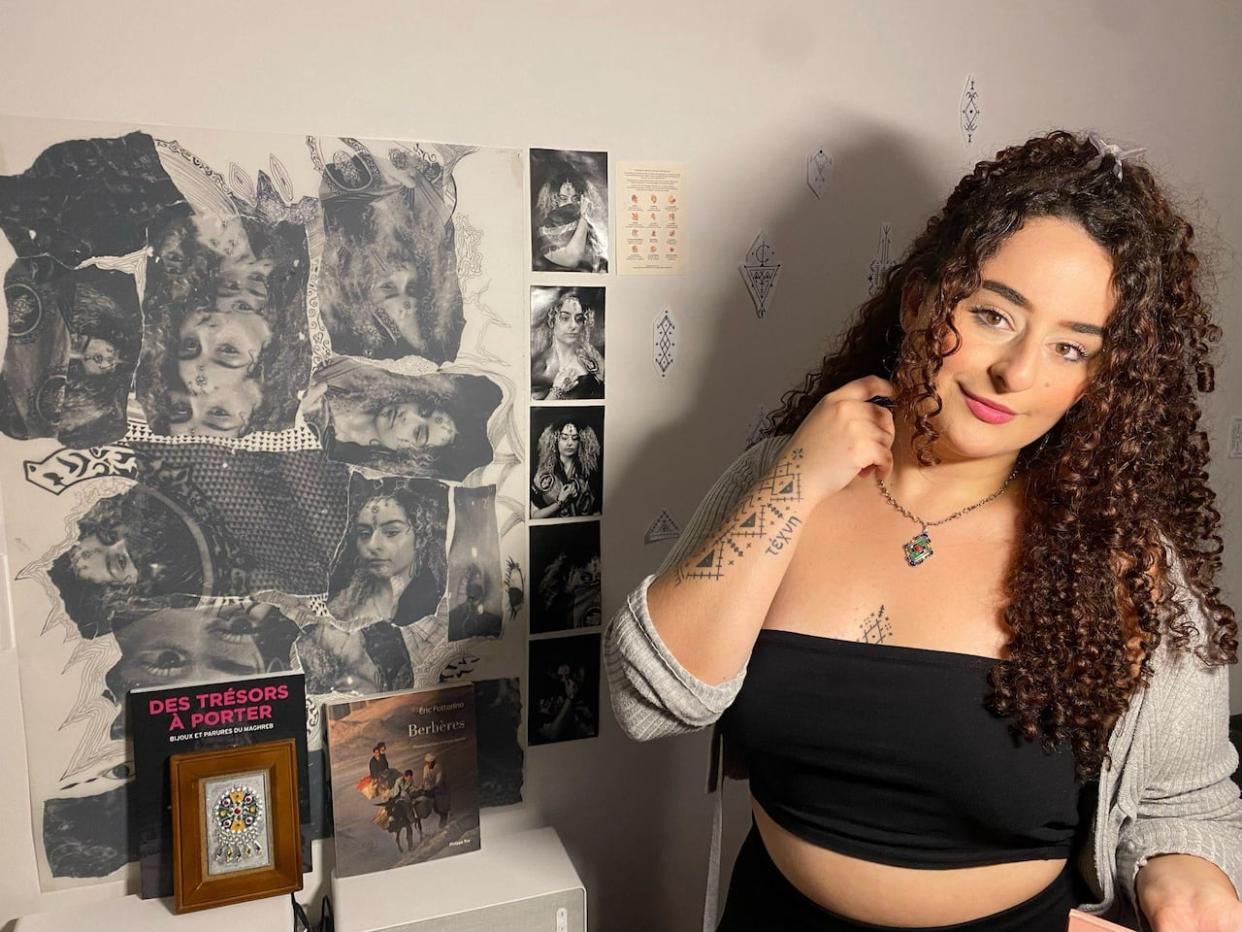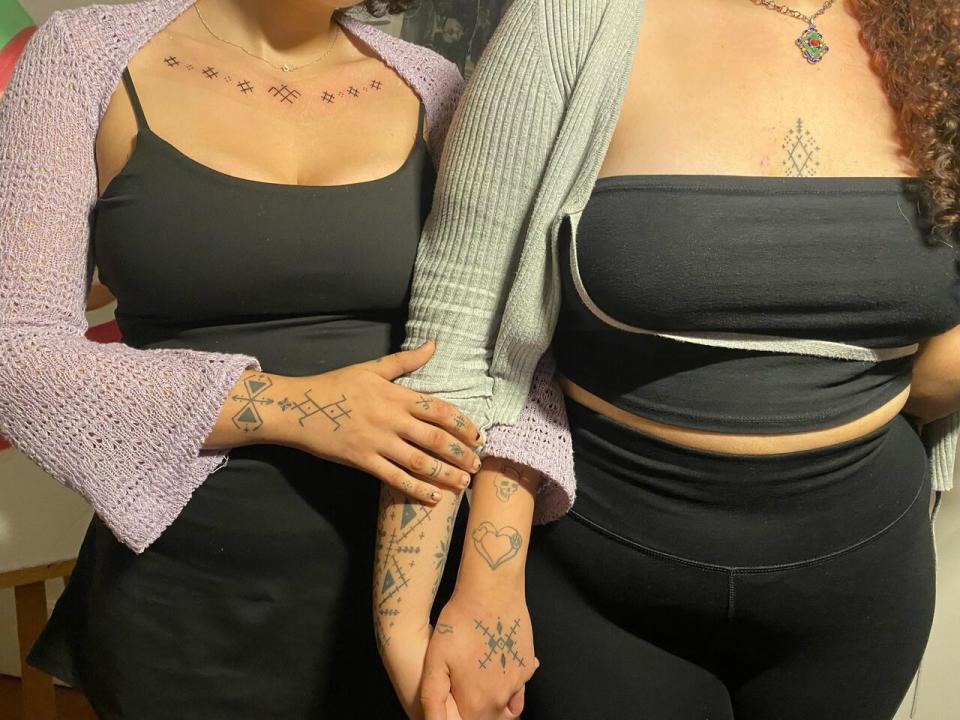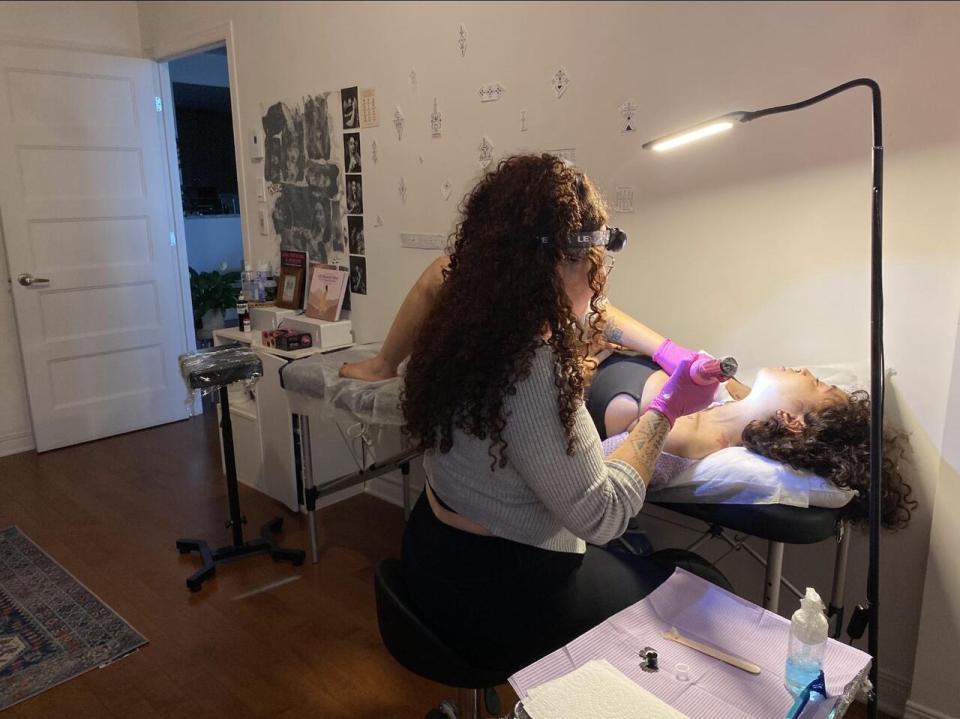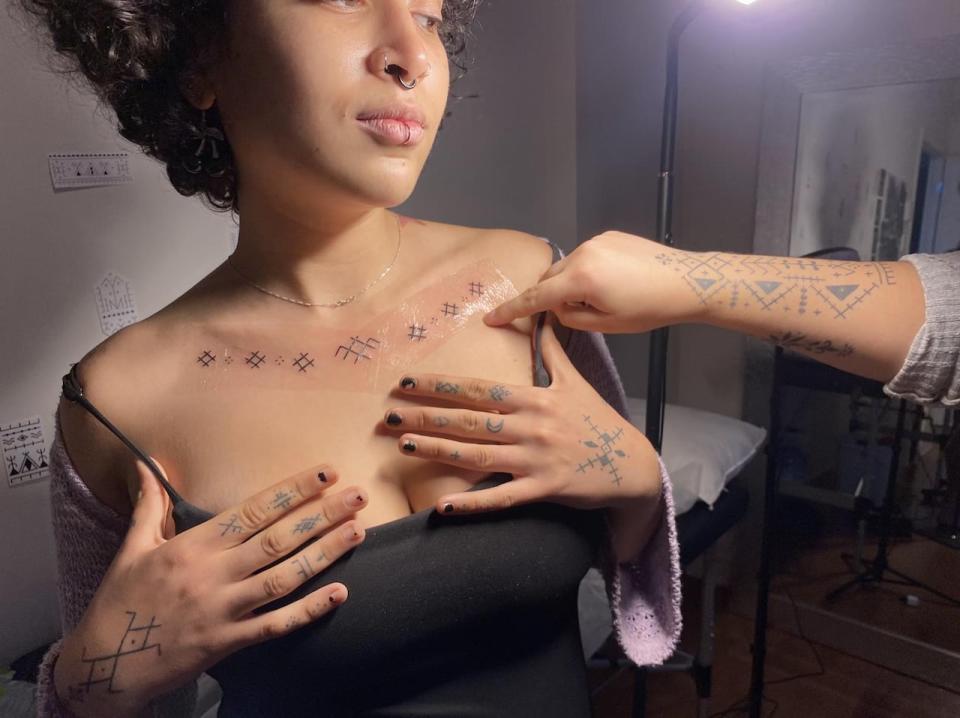Tattoo artist connects a new generation to North African Indigenous culture

This story was originally published in October 2023.
Iness Aguin's tattoo studio isn't like most you'll find in the Montreal area.
The studio is inside her Laval, Que., apartment, and geometric figures adorn the wall. Among them, the yaz (ⵣ) stands out, symbolizing freedom in Amazigh culture.
The space is filled with plants, books and other art pieces. Lo-fi music plays in the background.
There's an aura of healing, which goes beyond any individual client. Aguin is working to revive a traditional North African Indigenous tattoo style rarely practised here, despite Montreal's large population from the region.
"I wanted to reconnect with my roots since little has been taught to me about my own identity," says Aguin.
The tattooed symbols hold deep meaning and are seen as healing and spiritually powerful in Amazigh culture.
A graduate of fine arts at Concordia University, Aguin, 27, orients her artistic career through her identity. She is Kabyle, an Indigenous group from northern Algeria, and she's seeking to reappropriate her people's cultural markers that colonial powers had sought to erase.
The Kabyle are one of the groups that make up the Amazigh, who for thousands of years have lived in the Maghreb region of Africa. The Amazigh are known for their connection with nature, and a language and culture that is distinct from the majority Arab population.
Aguin became fascinated by how Amazigh tribes were largely matriarchal, which further set them apart from the Arab and Western worlds. In 2019, she travelled to Algeria and asked elder women about the meaning of their tattoos and why they got them. It was her way to keep the oral tradition alive.
"They shared a sense of shame as not being modern, civilized and going against religious rules," she said.

Aguin learned about the meaning of some Amazigh symbols while visiting Algeria in 2019. (Fatima El Gahami)
She brought what she learned about the tattoo style and the symbols' meaning back to Montreal, where she is a tattoo artist apprentice. She sees the art form as a way to protect the next generation from further losing a connection to their Amazigh identity, as there is little knowledge of the symbolism outside of the region.
Through her research, she created a guide for her clients to better explain the meaning of each symbol. It's her way of ensuring the symbols aren't simply appropriated by anyone for aesthetic reasons.
In the 10 months she has been practising, she's been heartened by all the support she received from Montreal's North African diaspora.
"People were curious," she says. "They asked questions about the symbols, the culture and then showed up to my studio to get tattooed just like their elders."
Aguin has a tattoo on her arm symbolizing protection, reconnection with her ancestors and attracting good fortune in life. On her sternum are symbols representing feminine energy and sensuality.
Keeping culture alive
Before starting the creative process with her clients, Aguin gets a feel for what the person likes and learns their personal story to choose which symbols to incorporate.
"Some share a folkloric story, others were meant for medicinal purposes or symbolized a new transition in life, for example being married," she says of the symbols she's studied.
She then uses a tattoo pen to mimic the traditional technique of tattooing with a sharp object like a needle or knife injected with ink made of plants, coal or minerals.

Aguin tattoos Youmna Siagh in her home studio. (Fatima El Gahami)
Youmna Siagh, 20, became a loyal client of Aguin's after learning about her through her sister.
''I was amazed by what my sister got tattooed and wanted to keep my culture alive too," Siagh says.
Siagh is Moroccan and Amazigh on her father's side. Growing up, she wasn't in touch with her culture but was able to learn more, including about traditional tattoos, while visiting Morocco in 2020.
"I went from being a tourist to a local in my home country," Siagh says.

Siagh shows her new tattoo on her collar. It's a crab, symbolizing love and gentleness. (Fatima El Gahami)
She now proudly wears her Amazigh tattoos. Aguin tattooed a crab, signifying love and gentleness, along her collar and lined it with ornamental stars.
"Iness creates special pieces of art in the world for each person," Siagh says.
Aguin sees the highest interest from young adults. She says one client, a young Algerian man, asked her for tattoos similar to those of his grandfather. He said his grandfather was tattooed from head to toe as a way to resist French colonizers during the 1950s, even though the practice was usually reserved for women.
"His grandfather empowered women, made a statement on the battlefield and now his son carries the tradition," Aguin says.
She hopes to inspire Indigenous people like her to reconnect with their identity through any way they see fit.
"There are many ways to do so. Art is the way for me," she says, adding that she would love to tattoo Indigenous people in Canada, as they share a similar history of colonization.
"It would be empowerment as a collective."

